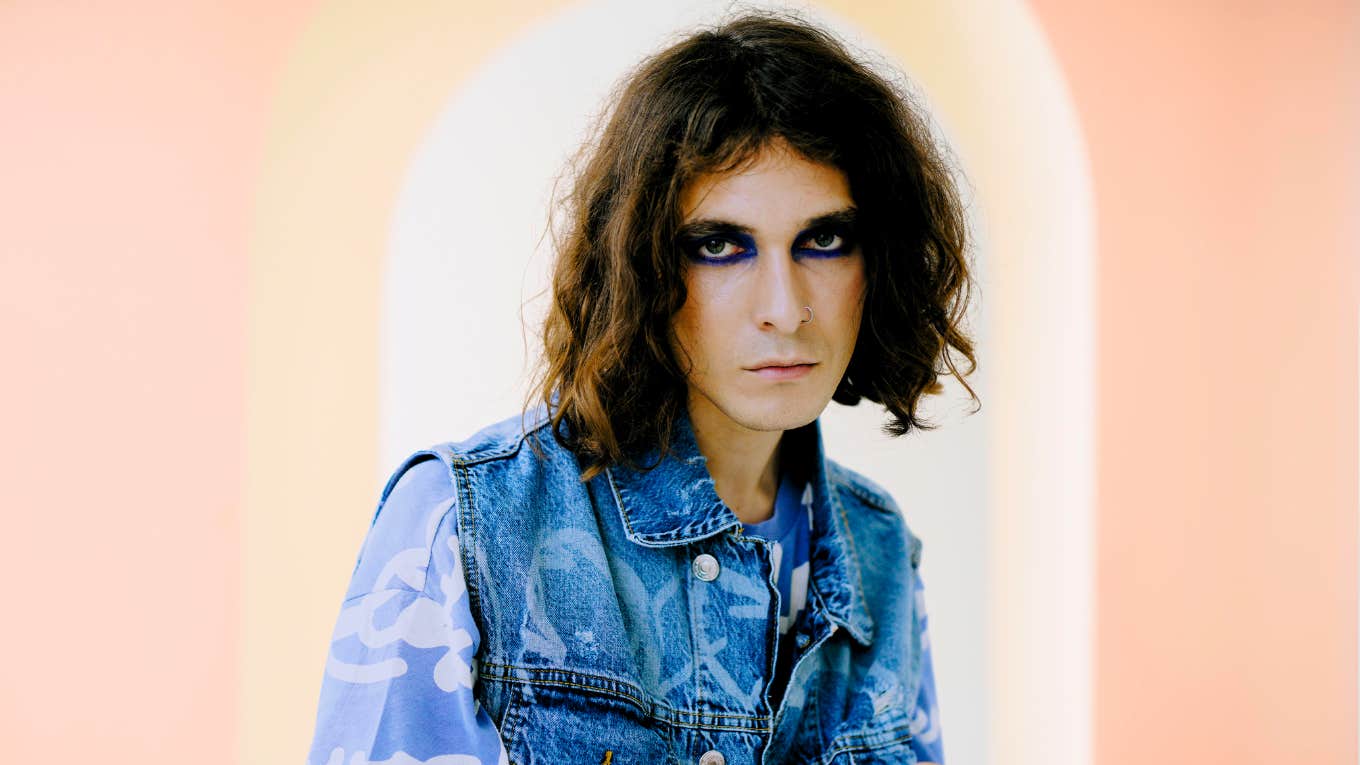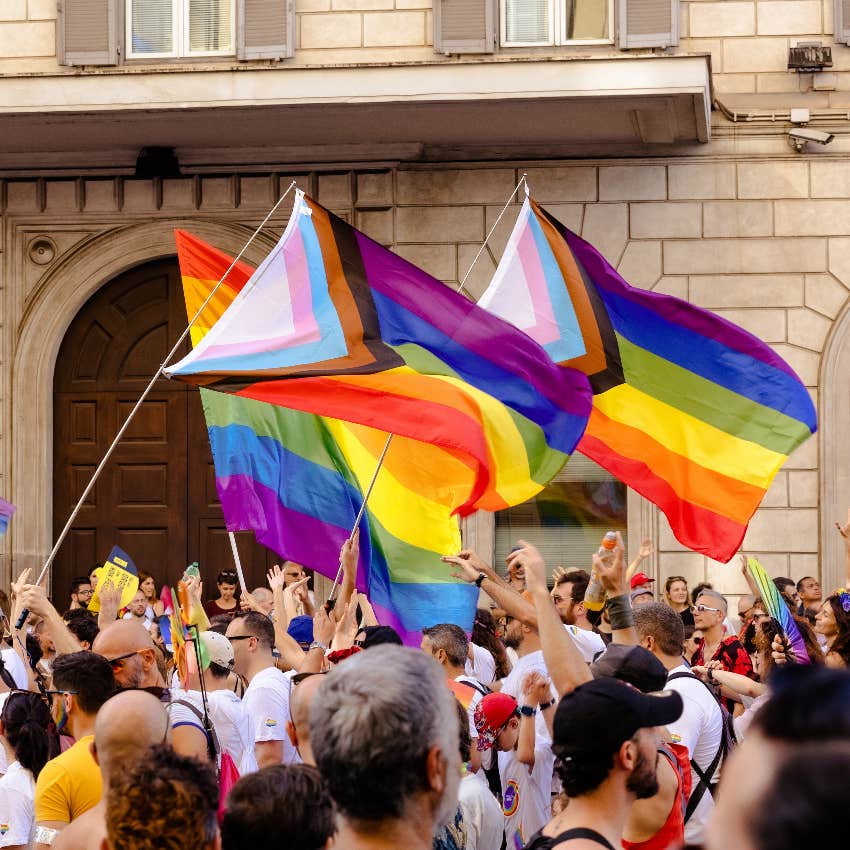Woman Shares Love For 'Gendervague' Partner — 'He Has A Feminine Side I'm Attracted To'
Someone who is gendervague cannot separate their gender identity from their neurodivergence.
 shvets production | Pexels
shvets production | Pexels My partner and I got out of the car and sprayed each other down with sunscreen. It was a hot one, with the sun dazzling overhead. Not a cloud in the sky on that pavement-melting June day. I sprayed his face, beard, and all. Then the back of his neck and his bare legs, rubbing it in thoroughly. I don’t mess around with sun exposure. I’m fiercely protective of my person.
“You look so good!” I told him for what was probably the hundredth time.
“No…Really?” he did a slow little twirl in his skirt.
“Yes! Look at your gorgeous legs! I’m jealous.”
He shook his head and smiled and blushed all at the same time as he searched for words — his signature bashful reaction to my compliments. Blue is the love of my life. And for the first time, he felt brave and confident enough to express the feminine side of his gender identity publicly. Our city’s huge Pride celebration was a fitting occasion.
He wore a short pleated skirt, knee-high socks, bright floral canvas shoes, and a black crop top. His longish blue hair fell just below his ears. My person looked gorgeous.
We had a long walk to the venue entrance. I loved the crowds because it meant a ton of people were coming to celebrate and support the Queer community. Our Midwestern city was pretty divided on whether or not to love and accept people who are different, so it felt good to see such a turnout.
 Fabrizio Maffei | Shutterstock
Fabrizio Maffei | Shutterstock
But parking was a nightmare, especially since we’d arrived in the afternoon, a few hours after the festivities had started. We found a grassy spot in the middle of nowhere, way down the road. Our sweaty walk to the actual festival would take about 15 minutes. And so we were off, our excitement high, ready to show the world we were a couple who celebrated and supported love.
The tone changed suddenly when a pickup truck rode up behind us. I heard it slow down. I heard the window lower. I heard the guy yell at us at the top of his lungs. He said one word — aimed specifically at my partner — before speeding off and leaving us in the dust.
“Well. That’s just awesome,” my partner said. “I’ve never experienced that before.”
You know the word. It rhymes with maggot — and it makes me feel just as gross and creepy-crawly to hear it belted at us. More so, probably. The truck was gone, but the word still hung heavy in the air around us, as stifling as the heat. What could we do? One loud slur at my bearded partner in a skirt, and the guy was out of there. I didn’t even see his face.
It was the first time he’d gone out dressed in clothing I’d only ever seen him wear in private, and this was the reaction he was met with in under five minutes. We were just minding our business on the way to Pride.
The indescribability of being gendervague
I’d been with Blue for a little over a year at that point. He was diagnosed with autism and ADHD later in life — at 38. By the time I met him, he’d already spent a few years researching, uncovering the unique parts of himself that he’d never known how to put into words before.
The word is gendervague. The term came into existence within the autistic community and refers to the uniquely neurodivergent experience of gender identity. It’s also sometimes called autigender or neuroqueer. Ryan Boren, co-founder and creative director of the Stimpunks Foundation, a nonprofit built by and for neurodivergent and disabled people, describes it like this:
Someone who is gendervague cannot separate their gender identity from their neurodivergence — being autistic doesn’t cause my gender identity, but it is inextricably related to how I understand and experience gender.
Autistic people’s brains are fundamentally different from those of anyone who is assumed to be “normal” or “healthy.” For many (but certainly not all) autistic people, we can’t make heads or tails of either the widespread assumption that everyone fits neatly into categories of men and women or the nonsensical characteristics expected or assumed of womanhood and manhood.
Before we ever met in person on our first date, Blue gave me the rundown on his autism and gendervague identity, which he shared with me in long, beautifully written info-dumps over a dating app chat.
For instance, he (or she or they — he’s comfortable with any of these pronouns) enjoys the look and feel of wearing women’s clothes. It’s a very pleasant sensory experience for him, as evidenced by the fact that he likes to shop by “feel,” often closing his eyes and letting his hands do the choosing.
He also enjoys the look and expression of dressing in a feminine way. He likes to put on lipstick and paint his nails. These things make him feel more at home inside his body.
He has a feminine side that I’m attracted to. He also enjoys wearing men’s clothing, and he displays a lot of behaviors one might call “masculine.” I’m also attracted to this part of him. Add to that the unique nonbinary sort of “otherness” about him. Something related to gender that’s neither masculine nor feminine. It’s all genders and none. It’s impossible to put into words. This is thevague in gendervague.
My partner is accommodating, gentle, nurturing, modest, and shy. He is also confident, intelligent, protective, and physically and mentally strong. He is a provider and works full-time. He cooks dinner. He rears his children and puts them to bed. He scrubs the toilet. He shops for groceries. He mows the yard. He’s the most skillful and attentive lover I’ve ever been with.
Which of these things are distinctly feminine or masculine? It doesn’t matter. He sees these traits and behaviors as something to be determined by one’s personality, skills, and preferences — not their genitals. In our relationship, what matters most to Blue is that we treat each other with love and respect. Not that we assign daily tasks according to our respective reproductive organs.
The harm of masking gender expression
People like Blue fall under the umbrella term of gender nonconforming. And while many neurotypical people choose this nonconformity because they understand the value of breaking harmful stereotypes and opposing sexism, some autistic people can’t choose this ideology — they simply embody it.
He’s said to me on more than one occasion, “I’m not a man.” He was born male, but “man” isn’t the right label for him. He has a wide range of gender fluidity that shifts with his mood. It’s directly linked to his brain wiring. That’s why I refer to him as my person or my partner. Boyfriend doesn’t do it justice. But, as a hyperintelligent individual, he certainly learned how to mask his gender expression early in life after facing negativity for it head-on.
“I was mocked for years for being too feminine,” he told me. “As a kid, I struggled to understand why one thing was okay for boys to do and another wasn’t.”
As a kid and teen, he saw that a large part of society — including family, friends, and bullies — wanted him to conform to a certain gender construct, or else they became very uncomfortable. Or even mean.
So he learned to accommodate others. Repression made the people around him more comfortable, and it got them to leave him alone. In a way, masking was a form of self-preservation. But it took a huge toll on his energy and happiness.
After his diagnosis, he got the education and support he needed to break through the masking. He was ready to explore being truly and uniquely himself — both on the inside and outside. The beautiful way Blue sees and accepts people’s human-ness outside of their gender is perfect — even if his autism and ADHD are indeed disabilities that can leave him struggling and shutting down.
That guy in the truck, the one full of hate and bigotry and unhappiness? He has no idea that he was trying to hurt such a loving, caring, and accepting person. Despite the verbal assault, the rest of our experience at Pride was unforgettable. While the journey there shook us, being inside the gates of Pride proper was nothing but love, acceptance, and a feeling of security everywhere.
The power of words
A full year later, Blue and I found ourselves walking on the street once again on a humid June evening. We’d parked in a public lot and were making our trek toward a popular local brewery. We’d just finished playing a co-ed Ultimate Frisbee game, and this was the place where the entire league gathered for burgers and beers afterward. It was crowded, with sand volleyball, pickleball, comradery, and cute dogs everywhere.
But outside the brewery, as Blue and I crossed the busy street, another experience transplanted us back to the year before. Someone drove up behind us — way too fast and close for comfort — and shouted that same hateful word at Blue. In addition, the stranger also tacked on “C*nt!” as he flew by, I assume for my benefit. Splendid. I have to admit, it’s different when a derogatory term is hurled directly at you. As much as I want to empathize with others, supporting someone who’s been hurt is not the same as getting hurt.
Though I can relate to being neurodivergent as someone with OCD, Blue’s existence as an autistic, gendervague individual is different from my own experience. It’s something I will never be able to fully grasp because I can’t live in his body, just as he can’t live in mine. I try to make it a point to recognize and honor that.
Being included in a verbal assault from some rando who wanted us both to feel horrible about ourselves was different than witnessing it, though both experiences gutted me. I guess we were drawing too much attention holding hands and quietly loving each other as we crossed a public street. There’s a slew of tedious teachings dedicated to the belief that words are harmless.
“Sticks and stones…”
“I’m rubber, you’re glue…”
“All bark and no bite…”
And so on. Society often blames people who are verbally abused for being weak enough to let mean words impact them. How toxic is that? To turn it around, the issue is the victim and their shortcomings, and not the people who spew hatred.
People like Blue and me — writers, readers, logophiles, and lovers of the evolution of new phrases when neurotypical labels just don’t cut it — know that words do, in fact, matter. They matter so, so much.
Holly Paige is an adventurous journalist and podcaster who loves to write about relationships, feminism, culture, and mental health. Her work is published on Medium and Substack.

